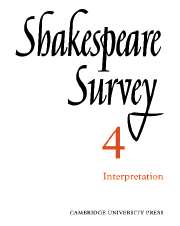Book contents
- Frontmatter
- Fifty Years of Shakespearian Criticism: 1900–1950
- Motivation in Shakespeare’s Choice of Materials
- The Sources of Macbeth
- Shakespeare and the ‘Ordinary’ Word
- Malone and the Upstart Crow
- An Early Copy of Shakespeare's Will
- The Shakespeare Collection in the Bodleian Library, Oxford
- Was there a ‘Tarras’ in Shakespeare’s Globe?
- Tradition, Style and the Theatre To-day
- Shakespeare in Slovakia
- Shakespeare in Post-War Yugoslavia
- International Notes
- Shakespeare’s Comedies and the Modern Stage
- The Year's Contributions to Shakespearian Study 1 Critical Studies
- 2 Shakespeare’s Life, Times and Stage
- 3 Textual Studies
- Book Received
- Index
- Plate Section
3 - Textual Studies
Published online by Cambridge University Press: 28 March 2007
- Frontmatter
- Fifty Years of Shakespearian Criticism: 1900–1950
- Motivation in Shakespeare’s Choice of Materials
- The Sources of Macbeth
- Shakespeare and the ‘Ordinary’ Word
- Malone and the Upstart Crow
- An Early Copy of Shakespeare's Will
- The Shakespeare Collection in the Bodleian Library, Oxford
- Was there a ‘Tarras’ in Shakespeare’s Globe?
- Tradition, Style and the Theatre To-day
- Shakespeare in Slovakia
- Shakespeare in Post-War Yugoslavia
- International Notes
- Shakespeare’s Comedies and the Modern Stage
- The Year's Contributions to Shakespearian Study 1 Critical Studies
- 2 Shakespeare’s Life, Times and Stage
- 3 Textual Studies
- Book Received
- Index
- Plate Section
Summary
Unless a work of art is to be studied in absolute terms as a timeless contribution to human culture, there can be no through understanding and appreciation of it until it has been fitted into a chronological pattern that will relate it to the other works in the canon and throw light on the development of the mind of the artist. Nor can a writer be studied intelligently without reference to the age in which he lived, the other writers of the time, and the events and movements which moulded, or were moulded by, them. It is the neglect or ignorance of this fundamental truth which leads to the framing of the questions one frequently hears: “What does it matter who wrote ‘Shakespeare’? We have the plays, haven’t we?” No rational account of the development of Elizabethan literature can be written unless we recognize that the author of ‘Shakespeare’ was a man who flourished at precisely the time of William Shakespeare of Stratford—neither earlier nor later—and accept the overwhelming evidence that William Shakespeare of Stratford is the author of the works then and now attributed to him. But the biographical records of playwrights of that age being scanty, there are gaps in the history and puzzles in the chronology of all the writers which continue to challenge our best efforts.
- Type
- Chapter
- Information
- Shakespeare Survey , pp. 153 - 163Publisher: Cambridge University PressPrint publication year: 1951

